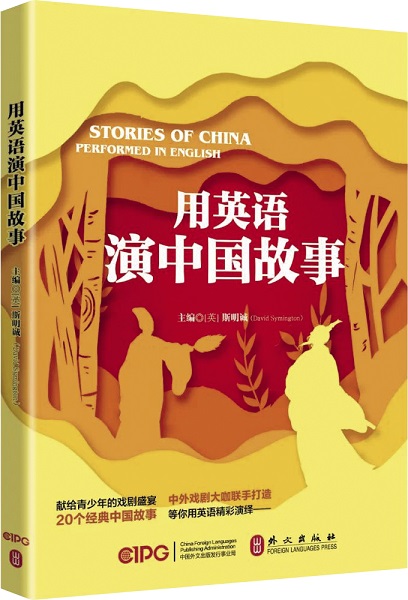
A Dramatic Wave of Passionate Learning
Stories of China: Performed in English
Chief Editor: David Symington
Price: RMB 78
Paperback, 260 pages
Published by Foreign Languages Press
Globalization has transformed the world into a more connected and interdependent place. Today, many Chinese students have the opportunity to go abroad and see more of the world, gaining a better understanding of other cultures while developing a global mindset. Speaking English is more than just a language skill, it is a crucial medium of connecting China to the world. A recent book titled Stories of China: Performed in English introduces an alternative way for young Chinese to learn English through drama education, performing stories, and disseminating Chinese culture at the same time.
The book contains 20 English scripts covering a wide range of subjects that are well known to most Chinese families. These include folklore stories of The Great Zodiac Race, the Ancient Allusions of a Foolish Old Man to Move Mountains, and Chang’e Flies to the Moon, biographical stories of great figures such as Qu Yuan – a patriotic poet of the Warring States Period (476-221 B.C.) and Lu Xun – one of China’s greatest modern writers, as well as the masterpieces of ancient Chinese science and technology, such as the Zhaozhou Bridge, the oldest stone-arched bridge in China which was built around 605.
Unlike most commonly seen English scripts for young readers that are based on adaptations of European and American stories, the stories presented in this book are based on classic Chinese stories, readapted and written in English. All these scripts are written by top playwrights from China, the U.K., and the U.S. The writting style is vivid, while the language is elegant yet comparatively simple. With a bilingual summary of each story in both Chinese and English, readers can get an overview of the plot. And through immersive reading, they can better understand the history and culture inherent in each story.
For example, Mencius’ Mother Moves Three Times tells the story of how the mother of the great ancient Chinese philosopher Mencius (372-289 B.C.) moved the family three times before finding a location with well-educated and properly behaved neighbors that she felt was suitable for the child’s upbringing. It reflects the great importance that Chinese people attach to their children’s education.
This story is adapted into a script with 10 scenes and the plot is translated into personae dialogues, easy for non-English speakers to perform on stage. Learners need to not only remember the dialogues, but also perform many scenes through which to reveal the characters’ thoughts and internal conflicts.
A comparison of Chinese and Western cultures can also be seen in the book, facilitating readers’ understanding of both. The first story, The Great Zodiac Race, is a good example of this. The 12 signs of the Chinese zodiac are all animals, whereas the Western zodiac is made up of 12 constellations that are connected to myths and legends.
The most common legend used to explain the specific order of the animals in the Chinese zodiac is known as the “The Great Race.” It was a special event held by the Jade Emperor, a great heavenly grandfather said to rule over all creation. He declared a race in which the first 12 animals will give their names to the 12-year cycle of the Chinese Zodiac in a repeating order. The result finally came out in the following sequence: the Rat, Ox, Tiger, Rabbit, Dragon, Snake, Horse, Goat, Monkey, Rooster, Dog, and Pig. This year is the Year of the Tiger according to the Chinese zodiac.
Considering the different levels of young readers’ vocabulary and knowledge base, the book is divided into three grades, from primary level to advanced level in terms of grammar and vocabulary, making it suitable for young English learners from elementary school to high school.
David Symington, the book’s chief editor, has master degrees in Classics from Oxford University and Chinese Philosophy from Fudan University. He has a thorough knowledge of both Chinese and Western cultures in drama education. He notes in the preface that at the end of the 19th century, the U.K. incorporated drama education into their primary education. With the help of drama, learners can memorize linguistic knowledge in an immersive way, devote themselves to the expression of sentences, and transform linguistic knowledge into thoughts, feelings, and opinions. Meanwhile, drama has irreplaceable advantages in cultivating students’ abilities in cooperation, imagination, and social interaction.
For Symington, the biggest challenge he faced in writing the book was how to adapt a traditional Chinese story into an English script that reflects the essence of Chinese culture, and also take into account the authentic language expression. To resolve this challenge, the playwrights include both English-speaking experts who have great enthusiasm for Chinese culture and Chinese writers who have been immersed in Western drama and culture for many years. Their words are precise, close to the characters and personalities, and their expressions are in line with the mindsets of native English speakers.
Stories of China: Performed in English may well be a frontrunner in combining Chinese and Western perspectives, along with cultural heritage, to tell Chinese stories to the world, as it sets off a new wave of passionate language learning among Chinese youth.